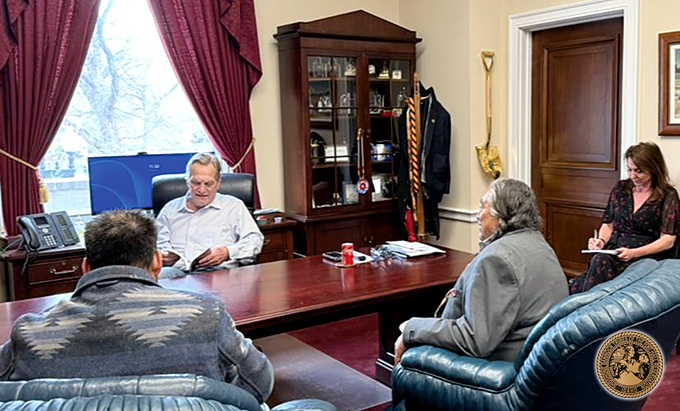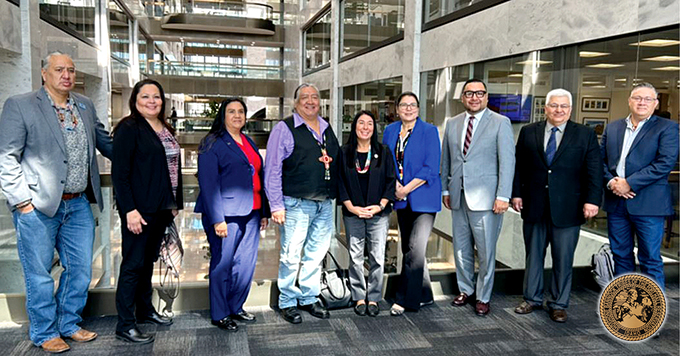FHBC Chairman Tendoy attends COLT meeting in Washington

FHBC Chairman Tendoy (right) discusses the Tribes’ ancestral lands with Congressman Mike Simpson (R-Idaho) in Washington D.C. (Submitted photo)
By MICHAEL STEELE
Tribal Policy Analyst
WASHINGTON — Fort Hall Business Council Chairman Lee Juan Tendoy traveled to Washington D.C. April 1-2 to join Tribal leaders from across the country and the Coalition of Large Tribes (COLT), an advocacy group for issues facing Tribes with land bases exceeding 100,000 acres.
Accompanied by Lytle Denny, Deputy Executive Director for Natural Resources, and Michael Steele, Tribal Policy Analyst, Tendoy participated in various meetings with administration officials and members of congress to discuss challenges in Indian country.
While addressing concerns about budget shortfalls, reductions in force (RIF) of federal employees, and executive orders affecting Indian country, Chairman Tendoy emphasized, “…our treaty is not with red or blue members political parties. It is with the United States Government.”
Other common-themes during the two-day event included addressing the chronic issue of inadequate law enforcement funding in Indian country, rectifying restrictions prosecuting crimes committed by non-Indians on reservations, and protecting porous reservation borders from crime and drugs. Senator Catherine Cortez Masto (D-Nevada) and member of the Senate Committee on Indian Affairs responded by highlighting renewed bi-partisan efforts to pass the Bridging Agency Data Gaps & Ensuring Safety (BADGES) for Native Communities act. The legislation aims to strengthen Tribal law enforcement capacity and increase public safety.
At the Department of Interior, Scott Davis, Acting Assistant Secretary of Indian Affairs (AS-IA) provided an update acknowledging objections to and complexities of reducing funding to Bureau of Indian Education (BIE) schools through a school voucher program. Davis also addressed the federal responsibility to fund law enforcement, fixing jurisdictional gaps, and simplifying the Fee-to-Trust process. Likewise, Fatima Abbas, U.S. Department of Treasury Director of Tribal Relations emphasized renewed rule-making efforts to treat tribes like states for taxation purposes, while cautioning that tribes must educate new administration officials about the trust and treaty responsibility.

FHBC Chairman Lee Juan Tendoy (4th from left) with other Tribal leaders from the Coalition of Large Tribes (COLT) in Washington D.C. (Submitted photo)
In addition to participating in COLT-organized meetings, Tendoy met with Congressman Mike Simpon (R-Idaho) and Salvatore (Sal) Corasaniti, Legislative Assistant to Senator Mike Crapo (R-Idaho). The Chairman used the opportunity during both meetings to reiterate the treaty and trust responsibility to protect Medicaid for Tribal members, express the Tribes’ opposition to a request to transfer the Camas National Wildlife Refuge to the state of Idaho, and request assistance advancing the Columbia Basin Fish Accords with the Bonneville Power Administration, which provides vital funding to protect salmon.
Denny explained that the funding is vital because it gives the Tribes the tools to protect salmon and uphold their responsibility to future generations. “If we invest in our salmon now,” he told Congressman Simpson, “we can prevent extinction later…This is about more than fish—it’s about our culture, our treaty rights, and a future where both our people and our salmon thrive.”
Other topics discussed with the Idaho delegation included the importance of protecting the Community Development Financial Institutions (CDFI) Fund that provides resources for disadvantaged communities, correcting errors made surveying the Eastern boundary of the reservation, and ensuring congress meets its obligations to Indian Country while drafting the Fiscal Year 2026 budget.
Congressman Simpson serves as House Interior and Environment Subcommitee on Appropriation chairman that is responsible for funding key agencies including the Department of Interior and Bureau of Indian Affairs. He emphasized the federal government must honor its treaty obligations something that has not been done over the last 200 years. The council will continue to advocate on behalf of the tribal membership as it remains focused on protecting and preserving federal trust and treaty obligations.





